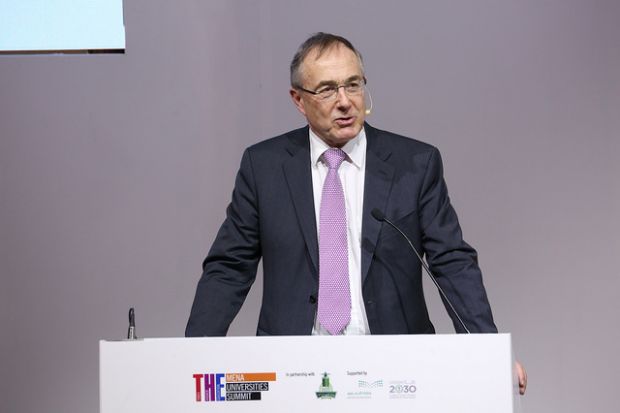Saudi Arabia could emulate China’s higher education success if it follows through with plans to invest heavily in its education system, a leading university president has suggested.
Michael Arthur, president and provost of UCL, was speaking about the country’s new Vision 2030, which includes plans for Saudi Arabia to reduce its dependence on oil, diversify its economy and develop public service sectors, including education.
He said it was clear that Saudi Arabia’s new Crown Prince, Mohammad bin Salman, was “developing and investing in a future” that will have “a very large number of young people coming through the population” and it was going to be “really important” that universities are a key part of this.
Opening the Times Higher Education MENA Universities Summit in Jeddah, Professor Arthur said: “There is huge social capital that goes with being educated in a university. This is the same around the world – people who go to university generally are a public good for the country, they contribute hugely, they don’t get involved in difficult behaviours, so I think there are many reasons why [investing in education] is a good idea.
“The Crown Prince and leaders of higher education have spotted that and it seems to me that they obviously have the resources to invest appropriately.”
He also compared Saudi Arabia’s vision to that of China, which has invested large amounts of money in its universities in a short period of time, to great success.
“If you look at China over the past 20 years and you look at its higher education system, they’ve shown what can be done with careful and thoughtful strategic approaches and with appropriate levels of funding,” he said.
“So I would imagine that the same will happen and is already happening in the Middle East and particularly here in Saudi Arabia.”
Professor Arthur’s comments were made during a question-and-answer session after he delivered a keynote speech on what makes a university global.
He said that, while universities must be both world-class and international to be global, it was possible to have these characteristics and “not be paying enough attention to the big problems that the globe is facing”.
“And I am totally convinced that you are only going to solve those problems working in partnership across institutions, across disciplines and across national borders,” he added.
He cited the example of a partnership that UCL has with the Africa Health Research Institute in South Africa to help eradicate HIV in a region in southern Africa where 15-year-old girls stand an 80 per cent chance of contracting HIV during their lifetime. “From the work we have been doing there, we have already halved the death rate of HIV in that population,” he said.
Register to continue
Why register?
- Registration is free and only takes a moment
- Once registered, you can read 3 articles a month
- Sign up for our newsletter
Subscribe
Or subscribe for unlimited access to:
- Unlimited access to news, views, insights & reviews
- Digital editions
- Digital access to THE’s university and college rankings analysis
Already registered or a current subscriber?










